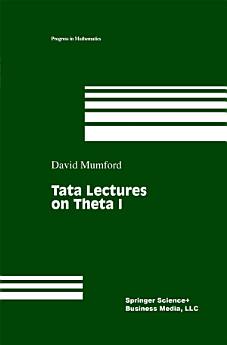Tata Lectures on Theta I
ທ.ວ. 2013 · Progress in Mathematics ຫົວທີ 28 · Springer Science & Business Media
ປຶ້ມອີບຸກ
240
ໜ້າ
reportບໍ່ໄດ້ຢັ້ງຢືນການຈັດອັນດັບ ແລະ ຄຳຕິຊົມ ສຶກສາເພີ່ມເຕີມ
ກ່ຽວກັບປຶ້ມ e-book ນີ້
This volume contains the first two out of four chapters which are intended to survey a large part of the theory of theta functions. These notes grew out of a series of lectures given at the Tata Institute of Fundamental Research in the period October, 1978, to March, 1979, on which notes were taken and excellently written up by C. Musili and M. Nori. I subsequently lectured at greater length on the contents of Chapter III at Harvard in the fall of 1979 and at a Summer School in Montreal in August, 1980, and again notes were very capably put together by E. Previato and M. Stillman, respectively. Both the Tata Institute and the University of Montreal publish lecture note series in which I had promised to place write-ups of my lectures there. However, as the project grew, it became clear that it was better to tie all these results together, rearranging and consolidating the material, and to make them available from one place. I am very grateful to the Tata Institute and the University of Montreal for permission to do this, and to Birkhauser-Boston for publishing the final result. The first 2 chapters study theta functions strictly from the viewpoint of classical analysis. In particular, in Chapter I, my goal was to explain in the simplest cases why the theta functions attracted attention.
ໃຫ້ຄະແນນ e-book ນີ້
ບອກພວກເຮົາວ່າທ່ານຄິດແນວໃດ.
ອ່ານຂໍ້ມູນຂ່າວສານ
ສະມາດໂຟນ ແລະ ແທັບເລັດ
ຕິດຕັ້ງ ແອັບ Google Play Books ສຳລັບ Android ແລະ iPad/iPhone. ມັນຊິ້ງຂໍ້ມູນໂດຍອັດຕະໂນມັດກັບບັນຊີຂອງທ່ານ ແລະ ອະນຸຍາດໃຫ້ທ່ານອ່ານທາງອອນລາຍ ຫຼື ແບບອອບລາຍໄດ້ ບໍ່ວ່າທ່ານຈະຢູ່ໃສ.
ແລັບທັອບ ແລະ ຄອມພິວເຕີ
ທ່ານສາມາດຟັງປຶ້ມສຽງທີ່ຊື້ໃນ Google Play ໂດຍໃຊ້ໂປຣແກຣມທ່ອງເວັບຂອງຄອມພິວເຕີຂອງທ່ານໄດ້.
eReaders ແລະອຸປະກອນອື່ນໆ
ເພື່ອອ່ານໃນອຸປະກອນ e-ink ເຊັ່ນ: Kobo eReader, ທ່ານຈຳເປັນຕ້ອງດາວໂຫຼດໄຟລ໌ ແລະ ໂອນຍ້າຍມັນໄປໃສ່ອຸປະກອນຂອງທ່ານກ່ອນ. ປະຕິບັດຕາມຄຳແນະນຳລະອຽດຂອງ ສູນຊ່ວຍເຫຼືອ ເພື່ອໂອນຍ້າຍໄຟລ໌ໄໃສ່ eReader ທີ່ຮອງຮັບ.










